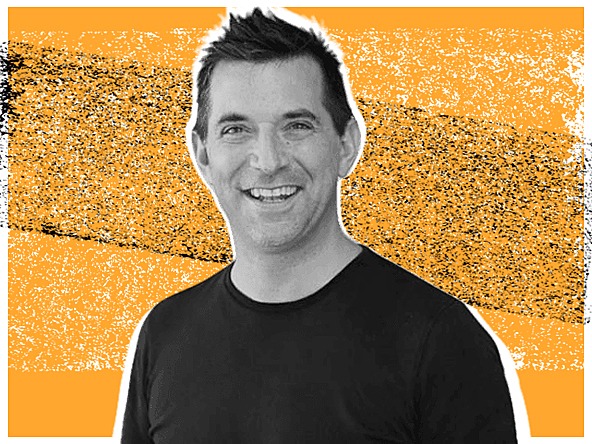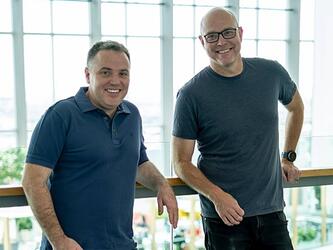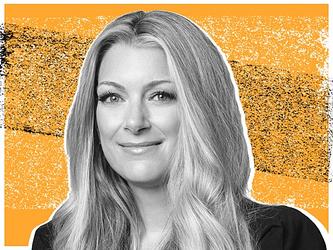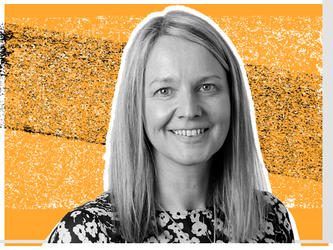How I work: Steve King, CEO, Black Swan

What does an average day look like for you?
I have children, so I tend to start work a little bit later. I drop them off at school as long as I’m not travelling and so I usually get to the office a bit later than most people but I’m obviously on the emails and using every second I can on the train.
I usually start my day – which is effectively endless meetings – properly at 10am. We’re a US-based business so often I’ll work until 10 or 11pm which means I can be available for our team and customers on the other side of the world. That’s a kind of average UK day but it’s obviously reversed if I'm in the US.
What are your biggest priorities in work at the moment?
Because of my specific job, most of it is about people – have they got what they need to do, and am I making sure I’m giving them everything they need to do their jobs? Then there’s customer work. I love problems so I can’t help myself – even if I’m not invited, I’ll be getting involved in customer briefs.
So, I’d say it’s about 50/50 making sure people have got what they need, and product/customer work.
Are you office based the majority of the time?
My life is 50% UK and 50% US – that, followed by me being completely disorganised and a shambles of a person, means I never really know where I’m going to be at any time. So, I just try to work wherever I find myself. Normally I try and do a day at home on a Friday, but I could be at the office, it’s just wherever I find myself.
Do you do anything in particular to help you focus or zone out distractions?
That’s something people should do more of, and I don’t. I do have an EA which is brilliant because she understands when I’m not doing things properly. She will block out time for me to work on things and make sure it happens. When that happens, I’m religious to it, I’ll put my headphones on and put my emails off.
I don’t have notifications coming in from Slack, emails or WhatsApp. I had to do that because I was getting a notification every second. I have no notifications of any sort whatsoever, I just check things regularly. That was a hack because it meant that, actually, most of the time people were solving problems themselves.
Do you find that helps your concentration?
Yes, I couldn’t [have them] because I’m so easily distracted. Also, ‘cc’ is a very dangerous thing.
With splitting your time between different time zones (the UK and the States) how do you approach boundaries between work life and home life?
My wife and I have a deal that on weekdays I belong to Black Swan, apart from in the mornings when my kids need me. I belong to the King family at the weekends. It’s very rare for me that work crosses over into the weekend, and it’s also very rare that I get any time off during the week. It was important for me to contract that in my relationship – I’m doing this job, it’s a job I want to do, it feels important to me so I want to do it this way. We haven’t divorced over it! Some people have trouble because they didn’t have that blunt chat at the beginning.
What is it that motivates you on a personal level – what are your interests?
Problem solving. I just can’t help myself getting drawn into that, in any shape or form. My hobbies and jobs before this were music related so I’m quite a pattern recognition person. It’s not one thing – it’s anything doing that. It keeps me really motivated and happy and interested. I love solving problems with people; getting in a huddle and doing the impossible thing which nobody thought was possible, with people who are much smarter than me.
What motivates you professionally and keeps your energy levels up?
I love our industry. The research industry is obviously so ahead of things because it’s our job to look at how things could be better but I’m a technologist and I feel that’s one thing that we’re not so good at in research at the moment.
We’re just beginning to see all our customers and others tool up with tools and technology. We’ve got a tech platform, so it’s thinking about how people can use it, how AI could be used to improve certain areas, where do we use these tools and where do we not use them. It blows my mind all the time.
Do you use any technologies or apps on a daily basis that help you in the business of what you do?
When I’m talking to customers about trends, I do use our own platform – we’ve got a secret weapon with that. In terms of surviving in my life, I fell in love with Microsoft To Do. I’ve always had to-do lists on a billion pieces of paper. I previously fell into the trap of keeping myself organised by always doing my emails which is the worst thing you could ever do because you’re just doing what everyone else [requests of you]. Then I found Microsoft To Do and you can link it with your emails, you can set up your to-do list, you can send it to people. I’ve finally found a to-do list technology that works for me, at the age of 47.
Are there any tips and tricks you’ve picked up for getting everything done?
I read The 4-Hour Workweek and there were some amazing tips in that for organising yourself and forcing yourself to do the things that are important. It’s a book that changed my life even though I still do 40 hours a week. I think Covid and working from home and working from the office has been really good for me and my team for thinking about when we’re collaborating and when we’re working. We’re now quite good at saying we’ll all come in on Thursday, fully knowing that we’ll achieve nothing, but collaborating and chatting is really important. Then, on my other days, I might go and sit in a café somewhere and work the list. No humans involved.
Just knowing that – this day is a collaboration day, this day is a workday, this day I’m probably not going to do very much – it just helps you and then you get on with whatever that is. I tell people: “Today is my collaboration day, so if you want to grab time, please do”.
Is everyone else at Black Swan also following that approach now?
I’m not going to say they’re doing it because I’m doing it, because that would be really vain! But I do think that people are concluding that locking things up in blocks, and being really transparent about what you’re doing, is a really good way of doing the same thing again and again and therefore being more efficient.
How do you communicate with the States? It can be a challenge to maintain connection with remote colleagues, so how do you approach that?
In my team, we are always together quarterly in-person and that will be a collaboration day. The rest is unfortunately Zoom, which is a bit clunky. I’m a Zoom bomber – without any warning I might appear in people’s houses and say: “Hi, let’s talk about the thing!” I’m trying to recreate that moment in the office where you say: “Can I ask you about…?” It’s not universally liked!
Insight has become more prominent within business in recent years. Has this shifting dynamic changed how you approach work?
In the past, insight was more of a strategy thing – now we’re seeing that some of our partners and customers need insight to solve an operational problem. The pace has increased and it’s much more agile.
At the moment, with the market being the way it is and not much breakthrough innovation going on, and the need for incremental innovation, it’s more always-on. You get more little questions rather than big questions like ‘what is the future of sandwiches?’ Our customers are really important, which is great because then we feel more important and that we’re able to make an impact.
What has been the impact of that on your working habits?
I now do so much of my senior top-to-top communication on text message and WhatsApp. In the old days, it feels like things were perhaps less urgent, and people could write an email brief. Now I’ll get an SMS from Stephan Gans at PepsiCo asking for a view on something, and we’ll text back the answer. You would never have worked that way in the past. You would never text a customer, you’d send them a PowerPoint. It’s more digital, more app-based and more agile.
This interview has been lightly edited for clarity.

We hope you enjoyed this article.
Research Live is published by MRS.
The Market Research Society (MRS) exists to promote and protect the research sector, showcasing how research delivers impact for businesses and government.
Members of MRS enjoy many benefits including tailoured policy guidance, discounts on training and conferences, and access to member-only content.
For example, there's an archive of winning case studies from over a decade of MRS Awards.
Find out more about the benefits of joining MRS here.














0 Comments